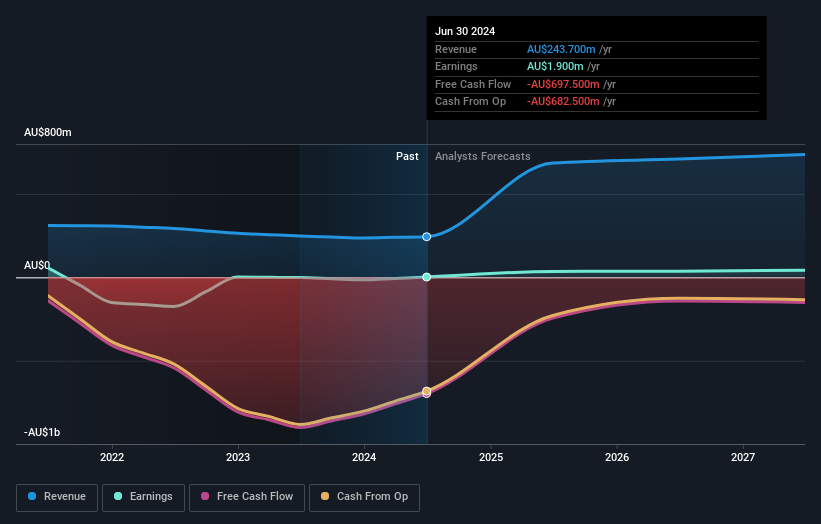- Australia
- /
- Consumer Finance
- /
- ASX:HUM
Individual investors invested in Humm Group Limited (ASX:HUM) up 27% last week, insiders too were rewarded

Key Insights
- Humm Group's significant individual investors ownership suggests that the key decisions are influenced by shareholders from the larger public
- A total of 9 investors have a majority stake in the company with 50% ownership
- Insiders own 28% of Humm Group
Every investor in Humm Group Limited (ASX:HUM) should be aware of the most powerful shareholder groups. The group holding the most number of shares in the company, around 43% to be precise, is individual investors. In other words, the group stands to gain the most (or lose the most) from their investment into the company.
Individual investors gained the most after market cap touched AU$319m last week, while insiders who own 28% also benefitted.
Let's take a closer look to see what the different types of shareholders can tell us about Humm Group.
See our latest analysis for Humm Group

What Does The Institutional Ownership Tell Us About Humm Group?
Institutions typically measure themselves against a benchmark when reporting to their own investors, so they often become more enthusiastic about a stock once it's included in a major index. We would expect most companies to have some institutions on the register, especially if they are growing.
We can see that Humm Group does have institutional investors; and they hold a good portion of the company's stock. This suggests some credibility amongst professional investors. But we can't rely on that fact alone since institutions make bad investments sometimes, just like everyone does. If multiple institutions change their view on a stock at the same time, you could see the share price drop fast. It's therefore worth looking at Humm Group's earnings history below. Of course, the future is what really matters.

Hedge funds don't have many shares in Humm Group. From our data, we infer that the largest shareholder is Andrew Abercrombie (who also holds the title of Top Key Executive) with 27% of shares outstanding. Its usually considered a good sign when insiders own a significant number of shares in the company, and in this case, we're glad to see a company insider play the role of a key stakeholder. With 6.4% and 3.6% of the shares outstanding respectively, Renaissance Smaller Companies Pty Ltd and Dimensional Fund Advisors LP are the second and third largest shareholders.
We also observed that the top 9 shareholders account for more than half of the share register, with a few smaller shareholders to balance the interests of the larger ones to a certain extent.
While it makes sense to study institutional ownership data for a company, it also makes sense to study analyst sentiments to know which way the wind is blowing. There is a little analyst coverage of the stock, but not much. So there is room for it to gain more coverage.
Insider Ownership Of Humm Group
While the precise definition of an insider can be subjective, almost everyone considers board members to be insiders. The company management answer to the board and the latter should represent the interests of shareholders. Notably, sometimes top-level managers are on the board themselves.
Insider ownership is positive when it signals leadership are thinking like the true owners of the company. However, high insider ownership can also give immense power to a small group within the company. This can be negative in some circumstances.
Our most recent data indicates that insiders own a reasonable proportion of Humm Group Limited. It has a market capitalization of just AU$319m, and insiders have AU$89m worth of shares in their own names. This may suggest that the founders still own a lot of shares. You can click here to see if they have been buying or selling.
General Public Ownership
The general public-- including retail investors -- own 43% stake in the company, and hence can't easily be ignored. This size of ownership, while considerable, may not be enough to change company policy if the decision is not in sync with other large shareholders.
Private Company Ownership
Our data indicates that Private Companies hold 6.3%, of the company's shares. It's hard to draw any conclusions from this fact alone, so its worth looking into who owns those private companies. Sometimes insiders or other related parties have an interest in shares in a public company through a separate private company.
Next Steps:
I find it very interesting to look at who exactly owns a company. But to truly gain insight, we need to consider other information, too. For example, we've discovered 3 warning signs for Humm Group (2 can't be ignored!) that you should be aware of before investing here.
Ultimately the future is most important. You can access this free report on analyst forecasts for the company.
NB: Figures in this article are calculated using data from the last twelve months, which refer to the 12-month period ending on the last date of the month the financial statement is dated. This may not be consistent with full year annual report figures.
Valuation is complex, but we're here to simplify it.
Discover if Humm Group might be undervalued or overvalued with our detailed analysis, featuring fair value estimates, potential risks, dividends, insider trades, and its financial condition.
Access Free AnalysisHave feedback on this article? Concerned about the content? Get in touch with us directly. Alternatively, email editorial-team (at) simplywallst.com.
This article by Simply Wall St is general in nature. We provide commentary based on historical data and analyst forecasts only using an unbiased methodology and our articles are not intended to be financial advice. It does not constitute a recommendation to buy or sell any stock, and does not take account of your objectives, or your financial situation. We aim to bring you long-term focused analysis driven by fundamental data. Note that our analysis may not factor in the latest price-sensitive company announcements or qualitative material. Simply Wall St has no position in any stocks mentioned.
About ASX:HUM
Humm Group
Provides various financial products and services in Australia, New Zealand, Ireland, the United Kingdom, and Canada.
Reasonable growth potential low.
Similar Companies
Market Insights
Community Narratives




